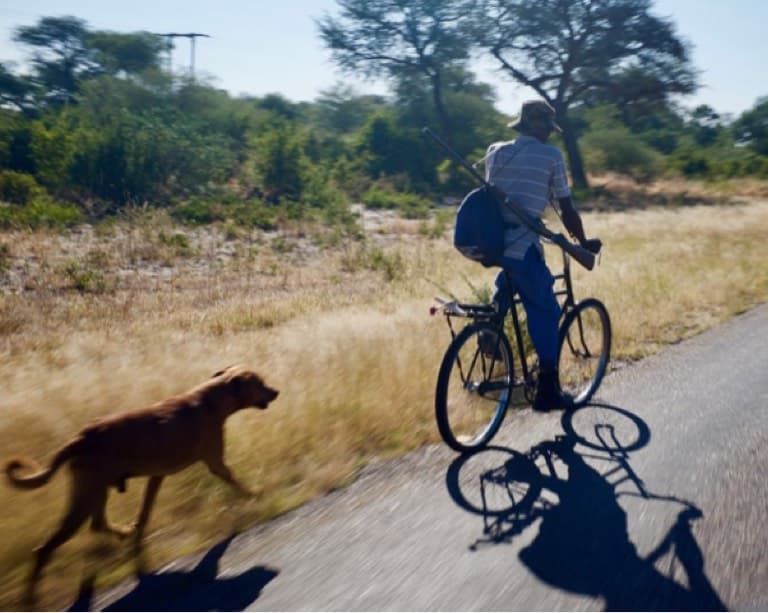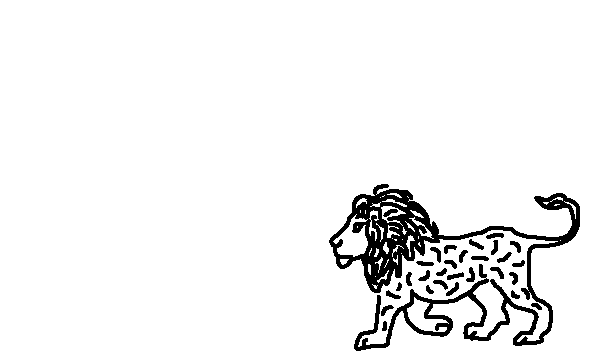ILLEGAL BUSHMEAT HUNTING INTERVENTIONS
Illegal bushmeat hunting is a widespread and growing threat to wildlife in savannah ecosystems across Africa, but its secretive and unregulated nature undermines efforts to mitigate its impacts on wildlife and wildlife-based industries. BPCT recently contributed to a signifcant study of this problem in Northern Botswana that collected data through interviews with hunters, randomly selected heads of households, wildlife experts, land concession managers and anti-poaching personnel.
The results of this study suggest that 1500 to 2000 illegal hunters currently operate in and around the Delta, predominantly in the western region, harvesting 244 500 to 470 000 kg of bushmeat annually. One of the key findings was that bushmeat poaching was predominantly carried out in the Okavango Delta by young men, often mounted on horses or donkeys, using dogs and guns (as opposed to snares as more commonly used in neighbouring Zambia and Zimbabwe) and that these men originated from areas close to wildlife areas. Perhaps most surprisingly they often came from wealthier households.
Additional key findings included the discovery that among medium to large herbivores impala and greater kudu were the most affected (in contrast to official records which suggest that large species such as buffalo and giraffe accounted for the largest proportion of offtake). This data importantly suggests that wildlife managers and law enforcement in Botswana do not currently detect harvests of small species effectively. Indeed our data suggest that the proportion of greater kudu killed each year in some areas is approximately equal to the species’ intrinsic growth rate.
Illegal bushmeat hunting constitutes a highly inefficient use of wildlife resources. Comparing the community benefits from illegal hunting to those from community-based photographic tourism operations in the northern delta demonstrates that tourism can provide benefits to local communities an order of magnitude greater than bushmeat hunting. Furthermore, illegal hunting fundamentally threatens the Okavnago’s wildlife populations and the area’s lucrative tourism industry which is dependent on wildlife. Hunters may kill four percent or more of many species’ populations annually. For greater kudu, ostrich, sable antelope and wildebeest, the annual harvest is likely greater than ten percent of the population. This may explain why more than half of interviewed hunters believe that one or more wildlife species is in decline.
The aim of this project going forward is to further develop our understanding of this damaging trade and to attempt to mitigate the negative impacts of illegal hunting in Botswana’s Okavango Delta by implementing better strategies including job creation, to ensure that members of local communities derive direct benefits from wildlife resources, while simultaneously curbing illegal hunting.


PHD, FOUNDER AND DIRECTOR
THE RESEARCH AND CONSERVATION TEAM AT BPCT
J. Weldon “Tico” McNutt, (PhD) is the Founder and Director of the Botswana Predator Conservation Trust (www.bpctrust.org). He began his pioneering conservation work on African Wild Dogs (Lycaon pictus) in the Okavango Delta in 1989 as a graduate student at the University of California, Davis. In the past 26 years, working in Botswana with graduate students, local staff and trainees, Tico has charted the individual life histories of hundreds of wild dogs spanning eight generations. After years of research on this previously misunderstood and persecuted species – Africa’s most endangered large carnivore-, the African wild dog is now among those most sought after by African wildlife tourists. Tico now supervises a growing team of researchers and students from around the world to fulfill BPCT’s broader mission: the conservation of all African large carnivore species. In 1996 Tico and his wife Lesley wrote the award winning book published by Smithsonian Books:“Running Wild: Dispelling the myths of the African Wild Dog”. They continue to supervise a research program and the research camp they built in 1990, and where they lived continuously for eleven years raising their two sons in the Eastern Okavango Delta. They now run BPCT from offices in the village of Maun where they have developed a Conservation Education Centre for local primary school children, a children’s wildlife education program called Coaching Conservation, and the Laboratory for Wildlife Chemistry, which is dedicated to deciphering the chemical language of territoriality of African wild dogs and other threatened wildlife species. Tico has been honoured with several awards including: the Distinguished Alumni Award for International Service in 2011 from the University of California Davis, Cal Aggie Alumni Association; the 2011 Tusk Conservation Award at the American Express Conservation Lecture Series at the Royal Geographic Society, London, UK; the 2015 Barrows Conservation Award at the Cincinnati Zoo in Cincinnati, OH. USA; and the 2015 Distinguished Alumni Award, at Lakeside School, Seattle, WA. USA.
